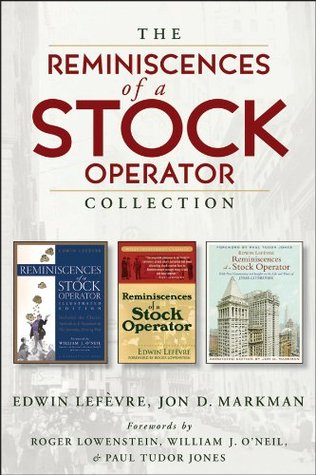Kindle Notes & Highlights
Read between
January 27 - April 19, 2019
What beat me was not having brains enough to stick to my own game—that is, to play the market only when I was satisfied that precedents favored my play.
There is a time for all things, but I didn’t know it. And that is precisely what beats so many men in Wall Street who are very far from being in the main sucker class.
there is the Wall Street fool, who thinks he must trade all the time. No man can always have adequate reasons for buying or selling stocks daily—or sufficient kn...
This highlight has been truncated due to consecutive passage length restrictions.
The desire for constant action irrespective of underlying conditions is responsible for many losses in Wall Street even among the professionals, who feel that they must take home some money every day, as though they were working for regular wages.
Livermore learns to avoid being dragged into the fray by all the commotion and to trade only when he has “sufficient knowledge to make his play an intelligent play.”
traders
should never trade to get even
In his early years, Livermore regularly finds himself losing money in new ways. Instead of complaining about his bad
luck, he studies his personal habits, thought processes, and procedures and determines how he can improve to adjust to new circumstances.
in order to succeed on Wall Street, it is more valuable to be adaptable than to be merely smart or rich.
there is only one side to the stock market; and it is not the bull side or the bear side, but the right side.
I must not begin to advance until I am sure I shall not have to retreat.
But if I cannot advance I do not move at all. I do not mean by this that a man should not limit his losses when he is wrong. He should. But that should not breed indecision. All my life I have made mistakes, but in losing money I have gained experience and accumulated a lot of valuable don’ts.
There is nothing like losing all you have in the world for teaching you what not to do. And when you know what not to do in order not to lose money, you begin to learn what to do in order to win. Did you get that? You begin to learn!
never was my thinking that made the big money for me. It always was my sitting.
the only players who reliably win are ones who first determine if the primary trend is bullish or bearish; buy or short early in the firmly established new trend; sit patiently through any short-term countertrends; and then have a firm philosophy for determining when to exit on a change in the primary trend.
It was not that all I needed to learn was not to take tips but follow my own inclination. It was that I gained confidence in myself and I was able finally to shake off the old method of trading.
the average man doesn’t wish to be told that it is a bull or a bear market.
What he desires is to be told specifically which particular stock to buy or sell. He
He will risk half his fortune in the stock market with less reflection than he devotes to the selection of a medium-priced automobile.
it is never wise for a speculator to fit his facts to his theories.
The price, per se, has nothing to do with establishing my line of least resistance.
The successful trader has to fight these two deep-seated instincts.
He has to reverse what you might call his natural impulses. Instead of hoping he must fear; instead of fearing he must hope.
did not look for the end on any fixed date. That was something quite beyond my power to determine.
The training of a stock trader is like a medical education.
You can transmit knowledge—that is, your particular collection of card-indexed facts—but not your experience.
Observation, experience, memory and mathematics—these are what the successful trader must depend on.
Fear and hope remain the same; therefore the study of the psychology of speculators is as valuable as it ever was.
“The principles of successful stock speculation are based on the supposition that people will continue in the future to make the mistakes that they have made in the past.”
Usually the object of manipulation is to develop marketability—that is, the ability to dispose of fair-sized blocks at some price at any time.
Activity is all that the floor traders ask. They will buy or sell any stock at any level if only there is a free market for it.


